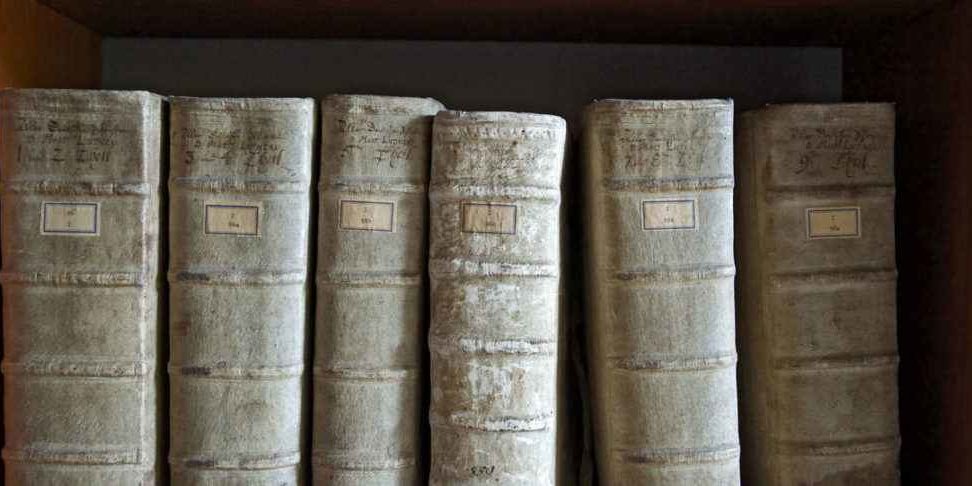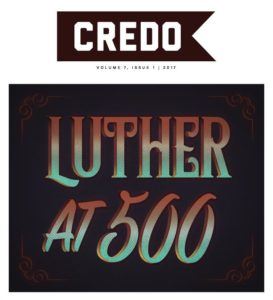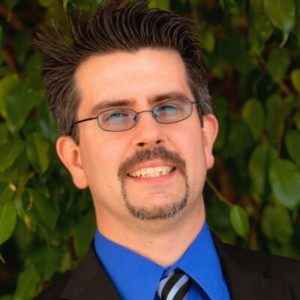
Benefitting From Luther’s Small Catechism
Reformation Day, October 31st, is upon us once more and it is a great opportunity to reflect upon the truths that define our core convictions as Protestants. A few years ago, we celebrated the 500th anniversary of the Reformation by releasing an issue of C redo magazine that was dedicated to the life and work of Martin Luther. The following article by Daniel R. Hyde is from that anniversary issue.
redo magazine that was dedicated to the life and work of Martin Luther. The following article by Daniel R. Hyde is from that anniversary issue.
Carl Trueman once quipped to me that since sixteenth-century Reformed theologians viewed Martin Luther (1483-1546) as a hero, they focused their criticism on all the other Lutherans but left “the Big Man” alone. An example of his influential status within my particular theological strand of the Reformation is in the Heidelberg Catechism. Its chief author was Zacharias Ursinus (1534-1583), who was one of Philip Melancthon’s (1497-1560) greatest students, who was in turn Luther’s successor. In fact, so great was Luther’s influence in the Palatinate, of which Heidelberg was capital, that Johann Heinrich Alting (1583-1644) told his students at the Collegium Sapientiae that while the Lutherans called Wittenberg mother and the Reformed called Zurich mother, the Palatinate called both mother.Luther said in a 1537 letter to the Strasbourg theologian, Wolfgang Capito, that he wouldn’t mind all his works being destroyed except his Bondage of the Will and Catechism. Click To Tweet
Luther has a big legacy. One of them is his Small Catechism. He said in a 1537 letter to the Strasbourg theologian, Wolfgang Capito (1478-1541), that he wouldn’t mind all his works being destroyed except his Bondage of the Will and Catechism (Luther’s Works, 50:173; hereafter LW). Let me as a Reformed (Calvinist) pastor commend to your reading Luther’s Small and Large Catechisms. In the space that follows, let me focus your attention on just his Small Catechism to offer a window into how I benefit from it (following the text in The Annotated Luther: Volume 4, Pastoral Writings, 212-252; hereafter AL).
Catechesis
The first benefit is catechesis itself. In the years of the late medieval period leading up to Luther, public catechesis was done four times a year in so-called Ember Weeks: the days of fasting during the seasons of Advent, Lent, Pentecost, and Holy Cross. As he preached the basics of the Ten Commandments, Creed, and Lord’s Prayer and began to write short catechetical works, Luther called upon others to write catechisms. This led to an explosion of thirty different catechisms from 1522-1530. But after his pastoral visitation of Saxony and Meissen from October 22, 1528-January 9, 1529, what he saw “constrained and compelled” him to preach three sets of sermons that became his published catechisms (the final set can be found in LW, 51:135-193).
Dear God have mercy, what misery I beheld! The ordinary person, especially in the villages, knows absolutely nothing about the Christian teaching, and unfortunately many pastors are completely unskilled and incompetent teachers…As a result they live like simple cattle or irrational pigs and, despite the fact that the gospel has returned, have masterfully learned how to misuse all their freedom. (AL 4:212)
What is done publicly from pulpits is also intended to be continued and lived out in private. While “many regard the catechism as a simple, trifling teaching, which they can absorb and master at one reading and then toss the book into a corner,” the great Doctor himself described how he of all people continued to read his own catechisms as an example to his people:
I say for myself…each morning, and whenever else I have time, I do as a child who is being taught the catechism and I read and recite word for word the Lord’s Prayer, the Ten Commandments, the Creed, the Psalms, etc. I must still read and study the catechism daily, and yet I cannot master it as I wish, but must remain a child and pupil of the catechism (AL 2:290).
Law-Gospel Clarity
Another benefit of the Small Catechism is the clear distinguishing of law and gospel in structuring it along the lines of the Ten Commandments, Apostles’ Creed, Lord’s Prayer, and the Sacraments. As Dr. Martin said at the end of his sermon on the Creed, “The commandments teach what we should do, but the Creed teaches what we have received from God. The Creed, therefore, gives that which you need. This is the Christian faith: to know what you must do and what has been given to you” (LW 51:169). This influence is seen in the Heidelberg Catechism, in which the structure is the law in its first use as summarized in the two great commandments of Matthew 22, then gospel as expressed in the Apostles’ Creed and Sacraments, and then the law in its third use through the Ten Commandments and Lord’s Prayer. Ursinus, in fact, opened his lectures through the Catechism by stating, “The doctrine of the Church is the entire and uncorrupt doctrine of the Law and Gospel touching the true God, and his will, works, and worship” (The Summe of Christian Religion, 1).This is the Christian faith: to know what you must do and what has been given to you Click To Tweet
The Ten Commandments
Delving into the Catechism, what is particularly interesting about Luther’s exposition of the Ten Commandments is how the first commandment “you shall have no other gods” is central. Its meaning is that “we are to fear, love, and trust God above all things” (AL 4:217), which Luther then applied at the beginning of his exposition of all subsequent commandments. For example, “we are to fear and love God” so that we don’t curse, don’t despise parents, tell lies, etc. (AL 4:218-222; see also his sermons on the Commandments, LW 51:137-161).
One caveat for the Reformed reader is Luther’s following the enumeration of the commands by Augustine (354-430) in which what we consider the first and second are the first, while what we consider the tenth is divided and becomes the ninth and tenth (Quaestionum in Heptateuchum, Libri VII:Liber II, Quaestio LXXI). This means there is a total omission of exposition of “you shall not make for yourself a carved image” (AL 4:218). One practical effect is the amount of images of Father (AL 4:217, 223), Son (AL 4:224, 227, 228, 229, 230, 235), and Holy Spirit (AL 4:225, 227) in the woodcuts that were originally included with the Small Catechism.
The Creed
On the Apostles’ Creed, Luther intentionally structured his exposition in a Trinitarian view rather than the medieval mythology of each of the twelve apostles writings one article (LW 51:162). Those of us who love the Heidelberg Catechism will immediately recognize familiar phrases in each of the three sections on Father, Son, and Holy Spirit. Of note is Heidelberg Q&A 1, “What is your only comfort in life and in death,” and its answer, which is reflected in Luther’s explanation of “I believe in Jesus Christ”: “He has redeemed me, a lost and condemned human being. He has purchased and freed me from all sins, from death, and from the power of the devil, not with gold or silver but with his holy, precious blood and with his innocent suffering and death” (AL 4:224).
The Lord’s Prayer
One particular example of how he applied his theology to questions from the pew is in his explanation of the Lord’s Prayer. Luther dealt head-on with the common misconception that since God does not need our prayers, we do not need to pray. Luther turned this on its head in the first through fourth requests to say that these things do come about without our prayers but that God wants us to pray that they would come about in our lives in personal ways: “To be sure, God’s name is holy in itself, but we ask in this prayer that is may also become holy in and among us” (AL 4:226).
The Sacraments
Finally, in coming to the sacraments it’s hard for us Reformed Christians not to read into the Small Catechism later polemics between Lutheran and Reformed Orthodox theologians. For example, I think of Bénédict Pictet’s (1655-1724) apt set of nine issues between the Reformed and “the august evangelical brothers” (De Augustanis Fratribus Evangelicis) in his 1711 Brevis Syllabus Controversiarum. On baptism, he said we differ over the relation between regeneration to baptism and the use of certain ceremonies like the sign of the cross. On communion, the differences concern Christ’s presence and what we eat with the mouth.
Yet don’t forget: Luther preached his catechetical sermons in May, September, and December 1528 and then published his catechisms in January (Small) and April (Large) 1529 before the Marburg Colloquy with Ulrich Zwingli (1484-1531) in October 1-4, 1529. Let’s try to read the Small Catechism, therefore, without 20/20 hindsight.
On both sacraments Luther makes his classic connection between the water, bread, and wine and the Word or promise of God. Of baptism he said, “Clearly the water does not [forgive], but the Word of God…for without the Word of God the water is plain water and not a baptism, but with the Word of God it is a baptism” (AL 4:231). Of the Supper he said, “Eating and drinking certainly do not do it, but rather the words that are recorded:“given for you” and “shed for you for the forgiveness of sins” (AL 4:236). He summarized this in his sermons: “The primary thing in the sacrament is the Word” (LW 51:188).All throughout the Small Catechism you get a feel for Luther the pastor. Click To Tweet
He also emphasized the role of faith (see LW, 51:182-193). As I read it, the Small Catechism does not teach baptismal regeneration (I’ll invoke J.V. Fesko on this: Word, Water, and Spirit, 41-56). Baptism “brings about forgiveness of sins, redeems from death and the devil, and gives eternal salvation to all who believe it, as the words and promise of God declare” (AL 4:231). And this is a daily believing. While we are baptized once, we must be daily baptized into the death of our old man and the rising of the new man (AL 4:232). I read this to mean that the benefits of baptism are not necessarily tied to the moment of administration. Luther had already said in The Babylonian Captivity of the Church (1520), “you have been once baptized in the sacrament, but you need continually to be baptized by faith, continually to die and continually to live…Indeed, we need continually to be baptized more and more, until we fulfill the sign perfectly at the last day.” (AL 3:72)
The Reformed believer may be tripped up in reading the Small Catechism by the insertion of private confession between baptism and communion. Keep in mind, though, John Calvin’s (1509-1564) thoughts on private confession (Institutes 3.4.12) as well as the fact that Luther’s earlier catechetical sermons do not mention confession nor does the Large Catechism. In fact, in the Large Catechism Luther says baptism “comprehends also the third sacrament, formerly called penance, which is really nothing else than baptism” (AL 2:400).
And while Luther does call the Lord’s Supper “the sacrament of the altar” and that it was “the true body and blood of our Lord Jesus Christ under the bread and wine” (AL 4:235), his emphasis on faith precludes anything resembling ex opere operato or later difficulties of the communicatio idiomatum between Christ’s divine nature and his post-resurrection human nature in relation to the elements of communion. Instead, Luther simply explains the benefits of “given for you” and “shed for you”: “forgiveness of sin, life, and salvation are given to us in the sacrament through these words” (AL4:236). It’s not the “bodily eating and drinking” that does “such a great thing,” but “the words that are recorded” (AL 4:236). Thus “whoever believes these very words has what they declare and state, namely, “forgiveness of sins” (AL 4:236); to receive communion worthily is a matter of faith: “a person who has faith in these words, ‘given for you’ and ‘shed for you for the forgiveness of sins,’ is really worthy and well prepared…the words “for you” require truly believing hearts” (AL 4:236).
Conclusion
Martin Luther continues to be “the Big Man” on many of our theological campuses 500 years after his 95 Theses. Despite our disagreements, his Small Catechism is an enduring treasure, even for us Calvinists.

